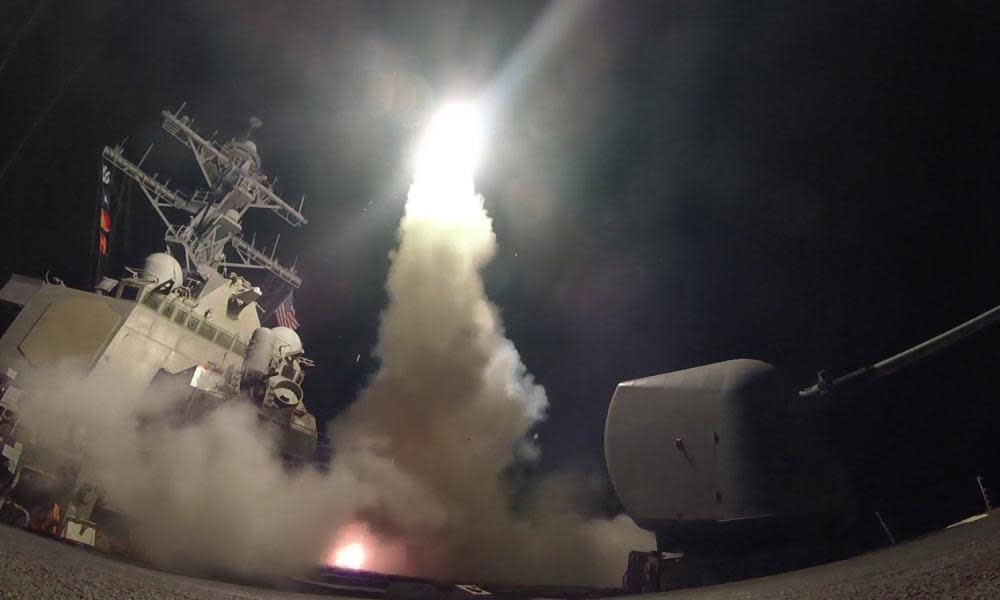US military strikes on Syria: what we know so far

The US has launched a missile strike against Syria for the first time since the civil war began, targeting an airbase from which the US said this week’s chemical weapons attack on civilians was launched by Bashar al-Assad’s regime.
What we know so far
The missile strikes targeted Shayrat airbase near Homs. The US has said this was the location from which Syrian forces launched a chemical attack on the rebel-held town of Khan Sheikhun on Tuesday morning.
The Pentagon said 59 Tomahawk cruise missiles were launched from the warships USS Ross and USS Porter in the eastern Mediterranean in the early hours of Friday morning, local time.
A Syrian official told the Associated Press that at least seven people had been killed and nine wounded in the US missile attack. Reuters reported that the Syrian state news agency said the strikes had killed nine civilians, including four children, in areas near the airbase. The death toll has not been independently verified.
Some reports said senior officers had evacuated the base before the missile strikes and after foreign countries were notified of an imminent attack by the US.
President Bashar al-Assad’s office said the strike was “foolish and irresponsible” and “revealed its short-sightedness and political and military blindness to reality”. It said the government would redouble its efforts against rebel groups after the strike, adding: “The disgraceful act of targeting a sovereign state’s airport demonstrates once again that different administrations do not change deeper policies.”
Syrian rebels welcomed the strike and called for additional action. “Hitting one airbase is not enough – there are 26 airbases that target civilians,” a key figure in the Army of Islam faction, Mohamed Alloush, said on Twitter. “The whole world should save the Syrian people from the clutches of the killer Bashar and his aides.”
Russia, a Syrian ally that has been helping the Assad regime target rebel-held districts, condemned the US action. Vladimir Putin’s spokesman, Dmitry Peskov, said the president regarded the strikes as “aggression against a sovereign state in violation of international law and under a false pretext”.
Peskov said Trump’s move would have consequences for relations between the two countries. “With this step Washington has struck a significant blow to Russian-American relations, which were already in a sorry state.”
A Russian defence ministry statement, read on state television, said the US attack had been “ineffective” and claimed Syrian authorities were looking for 36 Tomahawk missiles that fell outside the base and missed the target. The statement also confirmed Russia would stop cooperation and communication with US forces in Syria.
Shortly thereafter, the Russian military said it would help Syria strengthen its air defences after the strike to help “protect the most sensitive Syrian infrastructure facilities”. In a post on Facebook, the Russian prime minister, Dmitry Medvedev, wrote about “completely ruined relations” between Russia and the US, saying the US strike was “good news for terrorists”.
The US secretary of state, Rex Tillerson, said the strikes did not indicate a shift in US policy towards Syria, despite it being a significant change from the previous stance taken by the Trump administration. Tillerson said Russia bore responsibility for its handling of the 2013 deal that was supposed to remove Assad’s stockpile of chemical weapons.
The Pentagon confirmed Russia had been told of the impending strike through military channels, despite earlier claims from Tillerson that there had been no contact.
Hillary Clinton called for the US to “take out” Syrian government-controlled airfields just hours before Trump launched the strikes.
The move was supported by key US allies, including the UK, Australia, Israel and Saudi Arabia. Italy and Japan said they understood the action taken by the US.
The UK defence secretary, Michael Fallon, said the British government had not been asked to provide military support to the US attack but believed it was a “wholly appropriate” response to the chemical weapons attack. “We’re not committed to military action against Syria. Our parliament considered that before, back in 2013, and turned it down,” he said.
Iran, Assad’s regional backer, said it “strongly condemned” the strikes, as it condemned “all unilateral military action”. It said the action had been taken under the “pretext” of the chemical strike. Bahram Ghasemi, a foreign ministry spokesman, said the attack “strengthens the near-to-death terrorists and complicates the situation in Syria and the whole region”.
The United Nations coordinator for humanitarian affairs, Jens Laerke, said the UN had no sign that US military strikes against the Syrian airbase had had “any direct consequence” on overall aid operations in Syria. A UN human rights office spokeswoman, Ravina Shamdasani, said on Friday that use of chemical weapons, if confirmed, would amount to a war crime.
Nato’s secretary general, Jens Stoltenberg, said Assad “bears full responsibility” for the US missile strikes. The European commission said that its president, Jean-Claude Juncker, “understands efforts to deter future attacks” and that the EU stood ready to play its role in finding a political solution to the crisis.
The UN security council has met to discuss the US strikes. Britain’s UN ambassador, Matthew Rycroft, said Assad has been “put on notice”, describing the strike as a “proportionate response to unspeakable acts”. France’s UN ambassador, François Delattre, said Assad’s goal was “annihilation, quite simply, of all those who resist him, whatever the price might be”.


